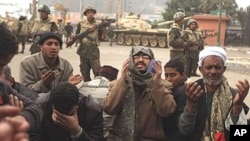After 14 days of massive protests against him, Egyptian President Hosni Mubarak remains in power and opposition groups doubt that talks with his government will resolve the country's crisis.
Their numbers are less than they were before, but the thousands of anti-Mubarak protesters camping on Cairo's Tahrir Square say they will not abandon their fight until Egypt's leader of nearly 30 years leaves.
Opposition groups say their talks with President Mubarak's government Sunday did not yield concrete results. They say the dialogue has not ended, but they are waiting for the leadership to make concessions before calling off the protests. The banned Muslim Brotherhood agreed to join talks for the first time.
President Mubarak has made concessions over the past week that include appointing a Vice President Omar Suleiman, announcing he will not seek reelection this year, and his party has seen the resignation of its top leaders.
|
Key Players in Egypt's Crisis
|
The protesters and some in the opposition want him to leave power - and the country - immediately.
Egyptians on Monday woke up to another day of tension, but signs of normalcy are slowly returning to the capital. Banks reopened after being closed for days, and streets were for the first time in more than a week choked with traffic as people return to work.
In Sunday's meeting, Suleiman also offered to ease restrictions on press freedom and to lift a deeply unpopular emergency law when the security situation permits. Mr. Mubarak introduced the law on taking office in 1981. It gives Egyptian security forces far-reaching powers to detain people perceived as threats to the state.
Egyptian opposition figure and Nobel Peace laureate Mohamed ElBaradei was not invited to the talks. In an interview with U.S. television network NBC, he criticized the meeting as "opaque" and said "nobody knows who is talking to whom at this stage."
The talks were the first known discussions in years between the Egyptian government and the Muslim Brotherhood. The Islamist group is banned from operating publicly, but its members have served in parliament as independents.
The United Nations estimates more than 300 people have died and thousands have been wounded in Egypt since the anti-Mubarak protests began.
Some information for this report was provided by AP, AFP and Reuters.

